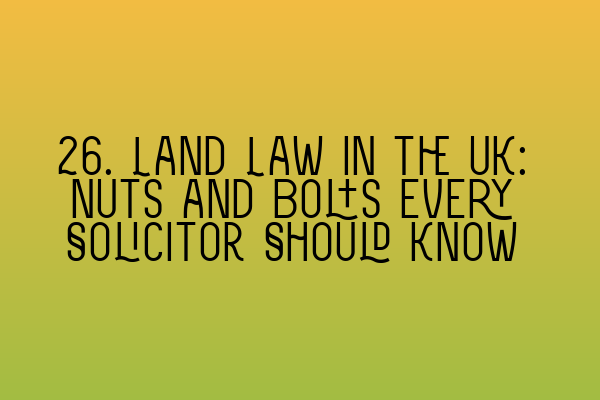26. Land Law in the UK: Nuts and Bolts Every Solicitor Should Know
As a solicitor specializing in property law and land law, it is crucial to have a thorough understanding of the legal framework that governs land transactions in the UK. Land law is the foundation of property law and forms the basis for many legal disputes and transactions involving real estate. In this blog post, we will discuss the essential nuts and bolts of land law that every solicitor should know.
1. Freehold and Leasehold
When dealing with land, it is essential to determine whether the property is held as freehold or leasehold. Freehold ownership grants the owner absolute ownership rights, while leasehold ownership allows an individual to hold the property for a defined period under a lease agreement. Understanding the differences between these two forms of ownership is crucial in advising clients and handling property transactions.
For a more comprehensive understanding of property ownership, you may wish to explore our SQE 1 Practice Exam Questions or SQE 1 Practice Mocks FLK1 FLK2.
2. Registered and Unregistered Land
In the UK, land can either be registered or unregistered. Registered land is recorded in the Land Registry, providing a clear record of ownership and any charges or restrictions affecting the property. Unregistered land, on the other hand, lacks an official record. Understanding the registration process and the implications of registered and unregistered land is crucial in navigating property transactions and resolving disputes.
For a more detailed insight into the registration process, you may find our SQE 2 Preparation Courses helpful.
3. Easements and Covenants
Easements and covenants are essential components of land law that can significantly impact property rights and obligations. An easement grants a non-possessory right over another person’s land, such as a right of way or a right to use utilities. Covenants, on the other hand, are binding agreements between parties that impose obligations or restrictions on the use of land. Familiarizing yourself with the various types of easements and covenants and their implications is vital in advising clients and addressing any disputes that may arise.
4. Adverse Possession
Adverse possession is a legal doctrine that allows a person to claim ownership of land belonging to another party by occupying and using it for a specified period. Understanding the elements and requirements of adverse possession is crucial in advising clients and handling cases where ownership of land is in dispute.
For additional resources on adverse possession and other property law topics, consider our helpful SQE 1 Preparation Courses.
5. Landlord and Tenant Law
Landlord and tenant law governs the relationship between property owners (landlords) and occupiers (tenants). Understanding the rights, obligations, and legal remedies available to both landlords and tenants is essential in advising clients on lease agreements, rent disputes, eviction procedures, and other matters related to the rental of properties.
If you’re interested in staying updated on important dates for SRA SQE exams, take a look at our comprehensive SRA SQE Exam Dates.
Conclusion
Land law is a complex and ever-evolving area of legal practice, requiring solicitors to stay updated on the latest legal developments and precedents. By mastering the nuts and bolts of land law, solicitors can confidently advise clients, handle property transactions, and effectively address any disputes that may arise. Keeping abreast of the latest legal knowledge and regularly refreshing your understanding of land law is crucial for success in this area of practice.
If you’re looking for further resources, visit our website for a range of preparation materials and courses designed to help you excel in property law and land law.
